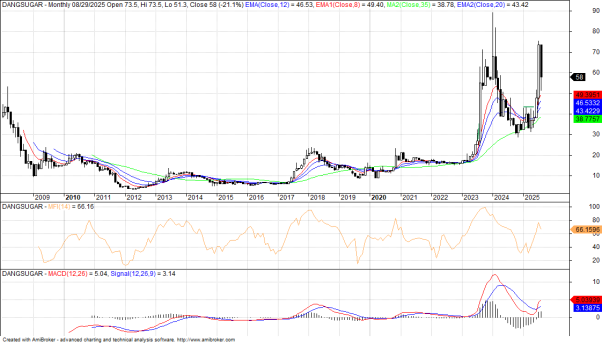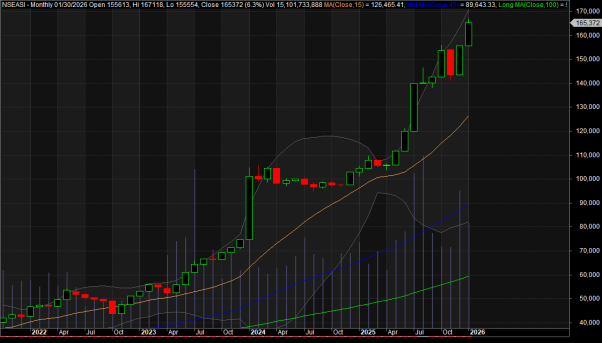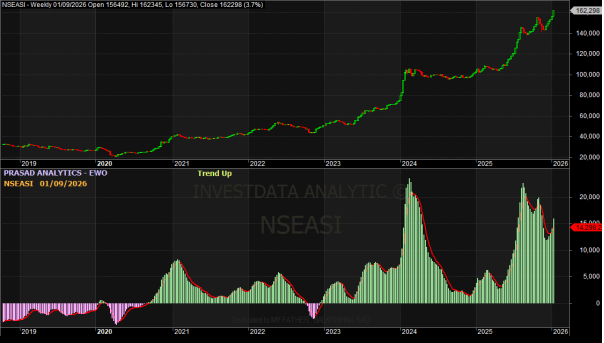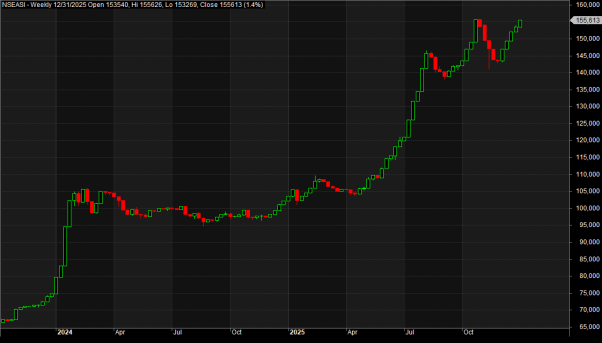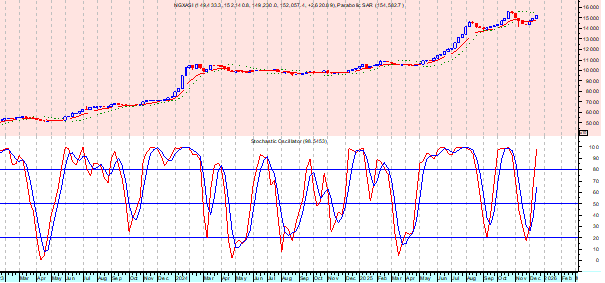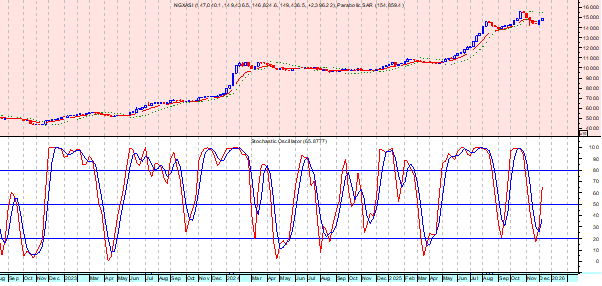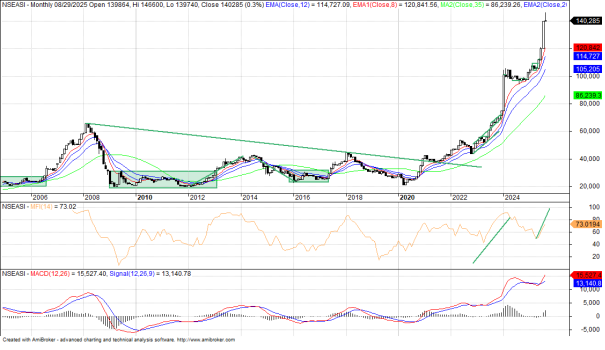
The Nigerian Exchange (NGX) sustained a bull transition for the month of August with marginal gain, thereby extending the four consecutive months of rally in the face of mixed sentiment, profit taking and selloffs that pulled the benchmark NGX All-Share index lower to close flat in the last three sessions. There were noticeable strong rallies in insurance and consumer goods stocks that lifted market sentiment in the midst of sectoral rotation that weighed down some sectors like mortgage, financial, and manufacturing counters. The market-maintained resilience despite volatility, with low-priced equities in the insurance space dominating the advancers’ table during the period.
NGXASI Monthly Chart

In all, trading activities in the month of August highlighted the resilience of the insurance sector, which clearly outperformed several others by posting double-digit growth. The consumer and industrial goods indexes posted 8.91% and 1.83% growth respectively for the period, while banking, energy and real estate stocks came under pressure, reflecting cautious investor sentiments and portfolio rebalancing which pulled these sectoral indexes lower during the month. This has signalled a reinforcement of the trend and capital rotation into undervalued and low-priced equities, while profit-taking dragged select large-cap names and blue-chip companies.
Market summary on weekly basis for the month
The month opened upbeat, with investors reacting positively to corporate earnings and positioning in banking, industrial, and consumer goods stocks. The ASI climbed from 141,263.05 to 146,570.69 points in that week, gaining 3.76% WTD, marking the highest point of the month. Market breadth was positive as mid- and large-cap stocks witnessed strong demand.
The second week saw cautious trades, with the index consolidating between 145,000 and 146,000 points, while investors booked profits on earlier gainers, amid renewed interest in defensive stocks that kept the market balanced. The ASI closed that week slightly lower at 145,822.36 points, shedding 0.51% WTD.
Bearish sentiment resurfaced, dragging the market down as profit-taking hit banking and energy stocks. The index dropped from 144,722.47 to 140,332.44 points, representing a steep 3.03% WTD loss. This marked the most volatile trading week in the month, with the market recording consecutive daily declines before staging a mild rebound at week’s end. This extended the NGX’s correction or pullback for two successive weeks to threaten the 142,000 psychological level.
The last trading week of August opened with a rebound, lifting the index to 141,004.14 points on Aug 22. However, selling pressure persisted through the week, particularly in large-cap stocks, dragging the ASI further down to 140,295.47 points. Overall, the market lost 2.51% WTD, sealing the week’s bearish close in the face of weak recovery and renewed selloffs.
Overall, month-to-date, the All-Share Index inched up by 0.31%, with the NGX 30 falling by 0.38%. The Banking Index posted a 5.09% loss, followed by the Pension Index’s 3.56% decline. The Insurance Index however faced the opposition direction, climbing 44.30% up, way ahead of the Consumer Goods Index which increased by 8.91%. as the industrial goods Index inched up by 1.83%.
On a year-to-date basis, the All-Share Index is up 36.31%, while the NGX 30 has gained 34.21%. The Banking Index surged 40.95%, the Pension Index jumped 47.30% up, the Insurance Index rose 78.77%, and the Consumer Goods Index posted a robust 84.24% increase. However, the Oil and Gas Index has suffered a 12.19% dip. Market breadth for the month was slightly positive, with 62 stocks advanced and 58 declined.
Mutual Benefits Monthly Chart
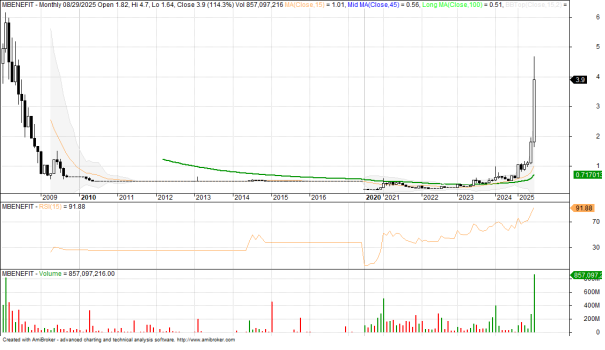
Mutual Benefits Assurance emerged as the top gainer for the month, opening at ₦0.91 each, and closing at ₦1.46 per share, thereby recording a growth of 60.44 percent. AIICO Insurance followed closely, rising from ₦1.09 to ₦1.74 to achieve a 59.82 percent gain. Royal Exchange also had an impressive month, moving from ₦0.90 to ₦1.43, up by 59.33 percent. Sovereign Trust Insurance appreciated by 59.06 percent, climbing from ₦0.64 to ₦1.02, while Cornerstone Insurance advanced 54.46 percent as its share price moved from ₦2.10 to ₦3.24. The insurance rally was further complemented by mid-tier performers such as Tripple Gee & Company, which advanced from ₦3.31 to ₦4.31, a 30.23 percent increase. Sunu Assurances Nigeria grew 23.80 percent, rising from ₦1.05 to ₦1.30, while Mecure Industries appreciated 20.50 percent, closing at ₦7.35 from an opening price of ₦6.10. Deap Capital Management added 19.26 percent to its value, moving from ₦0.54 to ₦0.64. Other significant movers during the month included Austin Laz, which closed at ₦2.64 after a 10 percent rally, Champion Breweries which rose 9.97 percent to ₦19.74, and NCR Nigeria which appreciated 9.77 percent to finish at ₦4.83.
UPDC REIT Monthly Chart
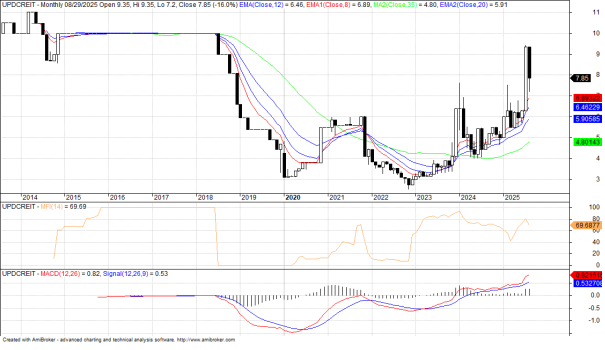
On the losers’ chart, UPDC REIT led with a decline of 17.72%, falling from an opening price of ₦4.18 to close at ₦3.44. LivingTrust Mortgage Bank followed, losing 16.00 percent as its share price dropped from ₦2.50 to ₦2.10. Berger Paints shed 14.67 percent, slipping from ₦13.08 to ₦11.16, while VFD Group declined by 11.19 percent, falling from ₦35.75 to ₦31.75. Unilever Nigeria also closed lower, dropping 10.29 percent from ₦11.70 to ₦10.50. In the blue-chip category, Stanbic IBTC Holdings shed 15.4 percent during the month, a decline largely attributed to profit-taking activities that followed its rights issue announcement
Technical View
The ASI extended its pullback below the 141,000 psychological level, closing the week at 140,295.49 points. Indicators point to weakness as the index trades below its short-term moving averages, while RSI is trending downwards toward oversold territory. The volume pattern shows heightened sell pressure, particularly in banking and industrial stocks. Key support lies at 140,000 and 138,500 points, while resistance stands at 141,800 and 143,000 points.
Outlook for the New Month
Going into September, the Nigerian equity market is expected to remain volatile as all eyes are on interim dividend paying banks, even as portfolio rebalancing continues ahead of the Q3 earnings reporting season. Bargain-hunting may resurface on undervalued stocks with strong fundamentals, particularly in insurance and consumer goods, while profit-taking could persist in some banking and industrial counters. Market direction will also be influenced by macroeconomic data, global oil prices, and policy updates from the fiscal and monetary authorities. As another CBN policy meeting comes up in the month of September.
Trending in the Economy: Nigeria’s Federation Account Allocation Committee (FAAC) shared a total of ₦2.001 trillion that accrued to the national treasury in the month of July 2025 among three tiers of government. From the disbursement, the Federal Government received ₦735.08 billion, States ₦660.35 billion, and Local Councils ₦485.04 billion, while oil-producing states shared an extra ₦120.36 billion as derivation. The revenue was drawn from statutory inflows of ₦1.282 trillion, ₦640.61 billion VAT, ₦37.6 billion EMTL, and ₦39.7 billion exchange gains. July’s gross revenue stood at ₦3.836 trillion, lower than June’s, largely due to weaker statutory income.
In a separate development, President Bola Tinubu announced plans by Brazil’s national oil giant- Petrobras to return to Nigeria, five years after leaving in the aftermath of his recent state visit to the country. Both nations sealed new pacts covering trade, aviation, finance, and energy. President Lula Da Silva also confirmed the launch of an Air Peace flight from Lagos to São Paulo, as Tinubu assured global investors that his administration’s ongoing reforms are improving Nigeria’s investment climate.
Global Market and Oil: U.S. stocks ended lower on Friday, dragged by weakness in major technology names. Dell slumped 8.9% after reporting high production costs for AI-focused servers, triggering a broader selloff in the sector. Nvidia lost 3.3% and Broadcom fell 3.6%, pushing the Nasdaq down 1.15% and the S&P 500 tech index 1.6%. The Dow slipped 0.20% while the S&P 500 shed 0.64%.
Fresh inflation data reinforced expectations of Federal Reserve rate cuts. The Commerce Department’s July Personal Consumption Expenditures (PCE) index rose 0.2%, with annual inflation steady at 2.6%. Core PCE, excluding food and energy, advanced 0.3%. Traders now price in an 89% chance of a September rate cut, with additional moves possible later in the year. The dollar weakened, with the euro rising to $1.1696.
Despite Friday’s decline, U.S. stocks closed the month higher: the S&P 500 gained 1.9%, the Dow 3.2%, and the Nasdaq 1.6%. European markets also slipped, led by losses in British banks, while inflation readings from France and Spain were mixed. MSCI’s global equity index dropped 0.5% and the STOXX 600 lost 0.64%.
Treasury yields edged higher as investors positioned for month-end, with the 10-year note at 4.22%. Oil prices retreated, with U.S. crude settling at $64.01 per barrel and Brent at $68.12. Attention now turns to next week’s U.S. jobs report and developments surrounding President Trump’s attempt to remove Fed Governor Lisa Cook
Monthly Chart View Of Sectorial Indexes
NGX Banking Index
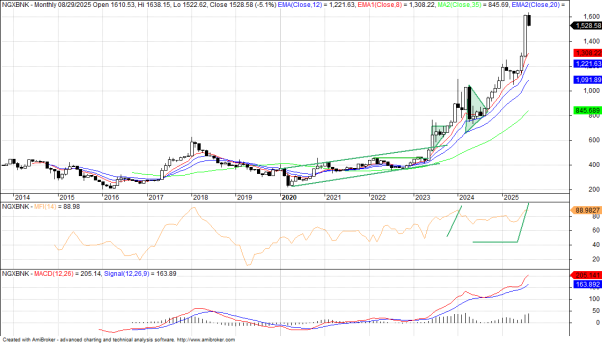
NGX Insurance Index
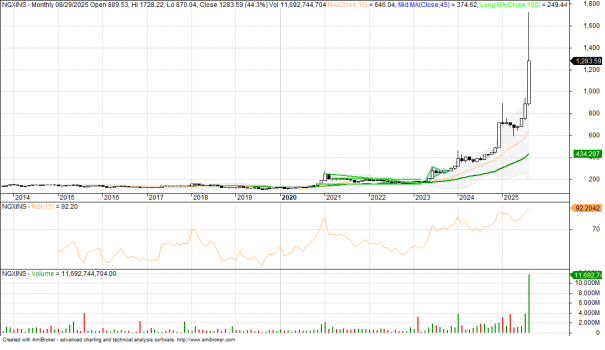
NGX Consumer Goods Index
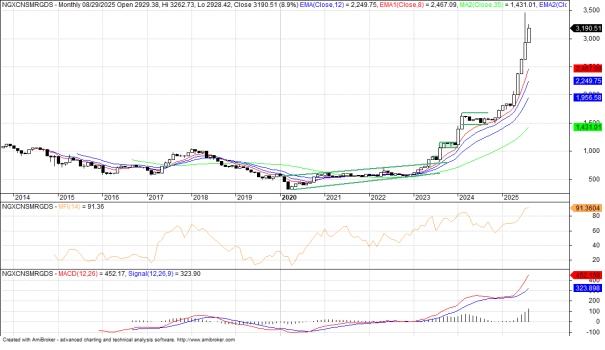
NGX Industrial Goods Index
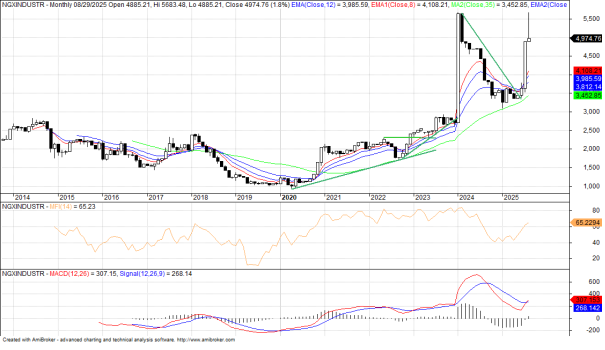
NGX Oil & Gas Index
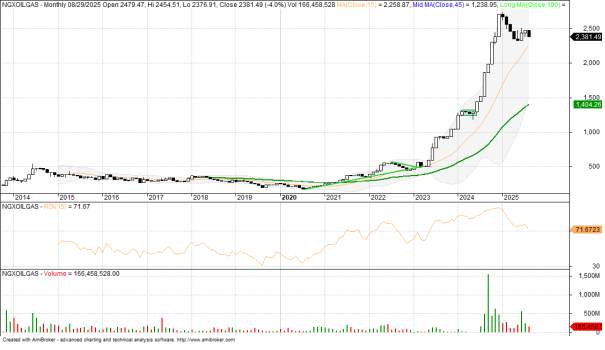
NGX Commodity Index
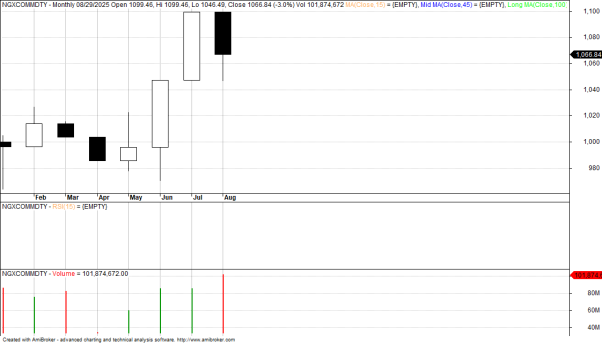
NGX 30 Index
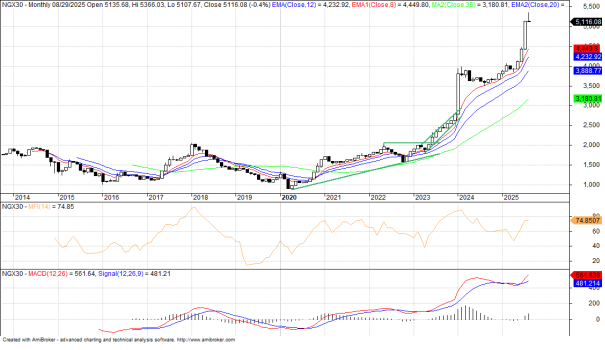
NEM
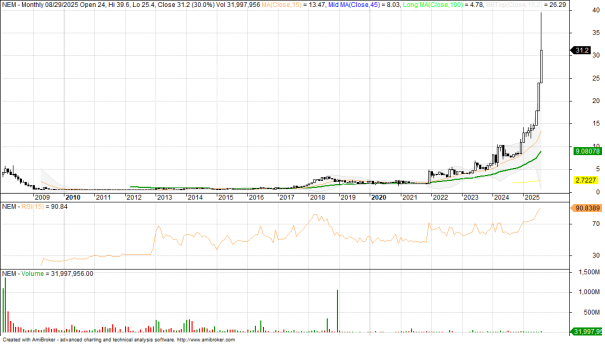
GTCO
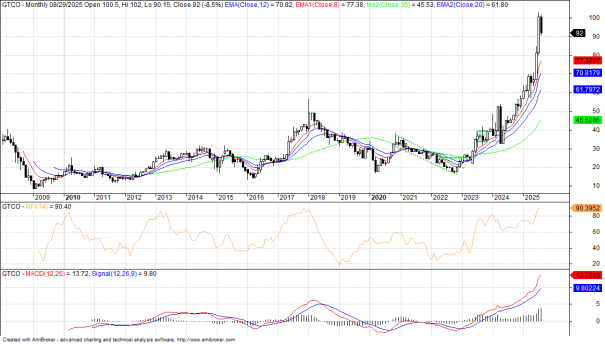
Zenith Bank

UBA
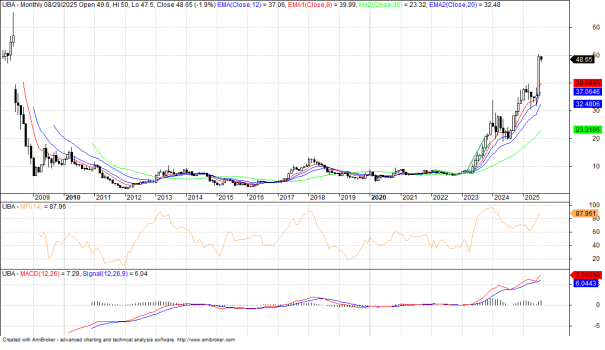
Accesscorp
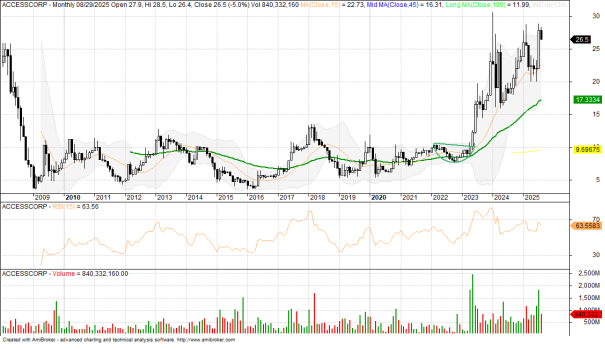
Stanbic IBTC
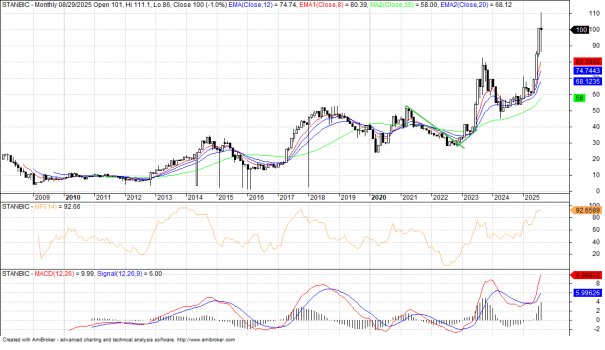
Fidelity Bank

Wema Bank
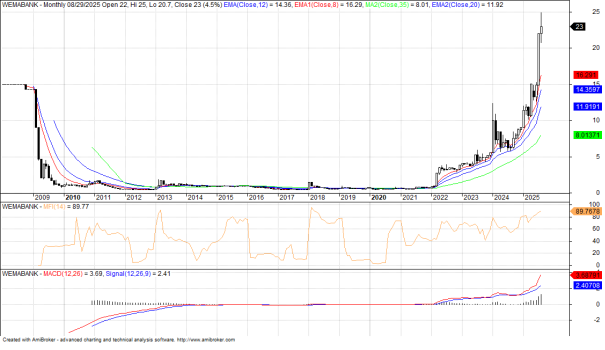
PZ
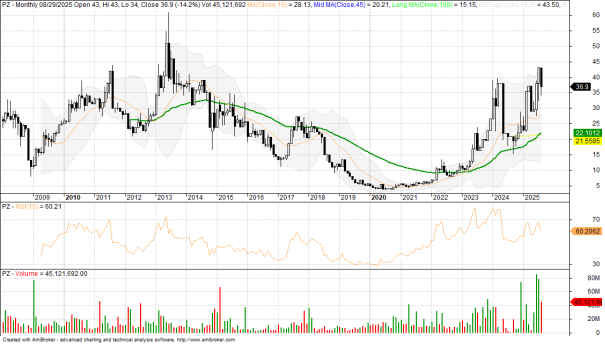
Dangote Sugar
